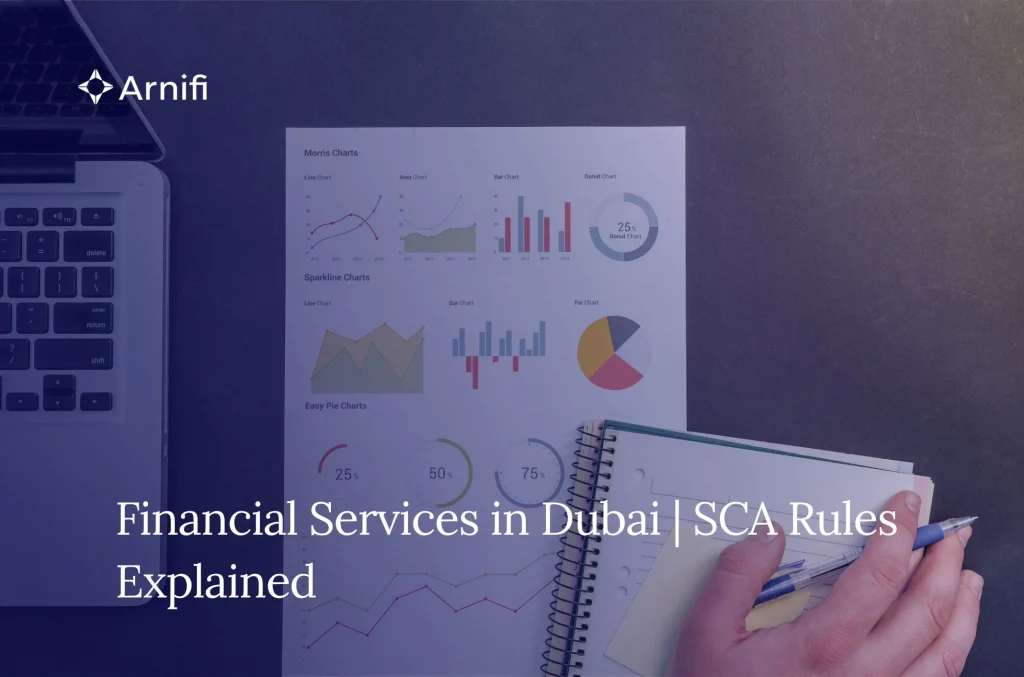SCA Regulations Explained | What Dubai Businesses Need to Know Before Offering Financial Services
by Rifa S Laskar Nov 24, 2025  7 MIN READ
7 MIN READ

Dubai has become a regional base for asset managers, brokers, advisors and fintech platforms. Any firm that wants to launch regulated financial services will meet the Securities and Commodities Authority at some stage.
The SCA works at federal level as the conduct and markets regulator for securities and investment products in the UAE, outside the two financial free zones.
This guide walks through how SCA rules fit into the wider UAE system, what they mean in day to day operations, and how financial services companies in Dubai can design business plans that pass review on the first attempt.
Table of contents
- Where the SCA Fits in the UAE Regulatory Map
- Financial Activities That Trigger SCA Oversight
- Licensing Pathways for Dubai Financial Services Firms
- Fit and Proper Tests for Owners and Senior Staff
- Ongoing Compliance Duties After Licensing
- Practical Design Tips for New Financial Services In Dubai
- Final Thoughts for Dubai Financial Firms
- FAQs
Where the SCA Fits in the UAE Regulatory Map
The UAE has more than one financial regulator. That can confuse new sponsors. At federal level, the Central Bank supervises banks, insurers and some payment providers, while the SCA looks after securities markets, investment services and many virtual asset activities in the wider UAE.
Inside Dubai, there are also specialist free zone regulators. The DFSA regulates financial services carried out in or out of the Dubai International Financial Centre, while the FSRA does the same in the Abu Dhabi Global Market.
For most mainland and non-free-zone structures in Dubai that plan to run brokerage, asset management, investment funds, crowdfunding or investment advice, the relevant gatekeeper is the Securities and Commodities Authority Dubai. Choosing the right regulator early avoids wasted months on the wrong licence route.
Financial Activities That Trigger SCA Oversight
The SCA’s Financial Activities Rulebook sets an umbrella regime that covers a wide set of services linked to securities, derivatives and similar products. The rulebook consolidates licensing and prudential standards for SCA-licensed firms into one framework, replacing several earlier scattered decisions.
Examples of activities that usually sit under SCA scope include:
- Managing investment funds and portfolios in listed securities or similar instruments.
- Arranging deals in securities, such as placing, underwriting or brokerage linked to stock exchanges.
- Operating crowdfunding platforms that raise money through securities or investment tokens.
- Providing financial consultation and financial analysis on securities for a fee as a regular business.
Important Advice: If a planned product involves securities, units in funds, structured notes or regulated virtual assets, sponsors need to check the latest SCA rulebook and virtual asset guidelines before they go near marketing.
Licensing Pathways for Dubai Financial Services Firms
Launching a regulated service usually follows a path. The detail varies by activity, yet the main building blocks repeat across applications.
Typical SCA Licensing Stages
- Decide the legal structure and shareholding that the rulebook allows for that activity, including any local ownership rules.
- Prepare the business plan, financial forecasts and governance chart in line with SCA forms and guidance.
- Submit the licence request, disclosure documents and fit-and-proper files for senior management through the SCA portal.
- Respond to SCA comments on risk controls, capital, reporting systems and outsourcing plans until the authority is satisfied.
Important Advice: For financial consultant services in Dubai, the SCA has long-standing rules on capital and ownership. A company that wants a financial consultation and analysis licence usually needs at least AED 1 million paid-up capital and majority ownership held by UAE or GCC nationals, or it must qualify as a foreign branch with a track record under a similar regulator.
Fit and Proper Tests for Owners and Senior Staff
Licensing does not stop at the entity. The SCA also checks people who will run or control the firm. The rulebook sets “fit and proper” criteria that cover honesty, integrity, financial soundness, competence and a track record of compliance.
In practice that means each proposed director, senior manager and key function holder will need:
- Clean regulatory and criminal records in every jurisdiction where they have lived or worked.
- Proof of relevant qualifications and experience that match the activities requested in the licence.
- Evidence that they are not over-committed to other boards or executive roles that could weaken oversight.
- Statements on conflicts of interest and how these will be managed inside the new firm.
Poor preparation at this stage is a frequent reason for delay. Boards that plan ahead on succession, independence and committee structures usually move faster through authorisation.
Ongoing Compliance Duties After Licensing
Once authorised, a firm becomes part of a live supervision cycle. The SCA expects continuous compliance with its rulebook.
Key ongoing duties include:
- Submitting periodic financial statements and capital adequacy reports on time.
- Classifying clients correctly as retail, professional or counterparties and tailoring protections to each group.
- Keeping clear records of advice, suitability checks and product disclosures, especially for complex or leveraged products.
- Following SCA and Central Bank joint guidelines on enabling technologies such as cloud, APIs and analytics, including cyber and data controls.
Breaches can lead to fines, licence restrictions or, in serious cases, suspension orders. Regular internal reviews against new circulars and Board decisions are vital, as the SCA continues to refine its virtual asset and marketing rules.
Practical Design Tips for New Financial Services In Dubai
Firms that treat SCA approvals as part of their business design usually find the process manageable. A few practical steps help keep projects on track.
Governance and Risk Design Tips
- Start with a clear activity map that links each product and client segment to the correct licence category in the rulebook.
- Build policies for suitability, conflicts, best execution and disclosure before testing systems or hiring sales staff.
- Align financial crime controls with Central Bank and SCA expectations on AML, sanctions and reporting, especially when using digital channels.
- Keep a simple compliance calendar that tracks reporting dates, periodic reviews and Board training linked to SCA updates.
Technology and Outsourcing Checks
Digital platforms, robo-advice tools and outsourced back-office services are now common in Dubai. The guidance issued by the Central Bank, SCA, DFSA and FSRA lays out shared principles on governance, audit trails, data security and third-party risk when firms adopt such solutions.
When assessing any vendor, firms should ask how logs will support SCA inspections, how data is segregated across clients, and how service levels align with business continuity plans. Clear contracts and exit plans protect both investors and the licence holder.
Final Thoughts for Dubai Financial Firms
SCA rules are detailed, yet they follow a consistent logic. The authority wants only well-capitalised, well-governed entities offering transparent products to clients that understand the risks. A sponsor that frames its plan this way will treat licensing as a design exercise rather than a last-minute hurdle.
By mapping activities carefully and building reporting and technology controls that match the rulebook, financial services companies in Dubai can create resilient structures that work for clients and regulators over the long term.
FAQs
What does the Securities and Commodities Authority do in Dubai?
The SCA supervises securities markets, licensing and conduct of regulated firms outside DIFC and ADGM. It sets rules for products, disclosure and investor protection in mainland Dubai and the wider UAE.
Which financial services usually need an SCA licence in Dubai?
Activities linked to securities require SCA approval, such as brokerage or portfolio management and financial consultation delivered through crowdfunding or advisory platforms that target investors in mainland Dubai or UAE.
What is a fit and proper test under SCA rules?
It is the SCA’s review of owners and managers that checks integrity and clean records plus proof of competence and financial soundness and capacity to oversee the licensed financial activity.
How do SCA rules interact with DIFC and ADGM regulators?
SCA rules cover securities activity in the mainland UAE. Inside DIFC or ADGM, DFSA or FSRA act as conduct regulators, with guidance on technology and AML standards plus virtual asset topics.
What should a new Dubai firm do before applying for an SCA licence?
Before filing, the firm should map activities to SCA categories, prepare a plan and design governance policies that show capital and systems plus staffing can support reporting and protection duties.
Top UAE Packages

Related Articles
Top UAE Packages



